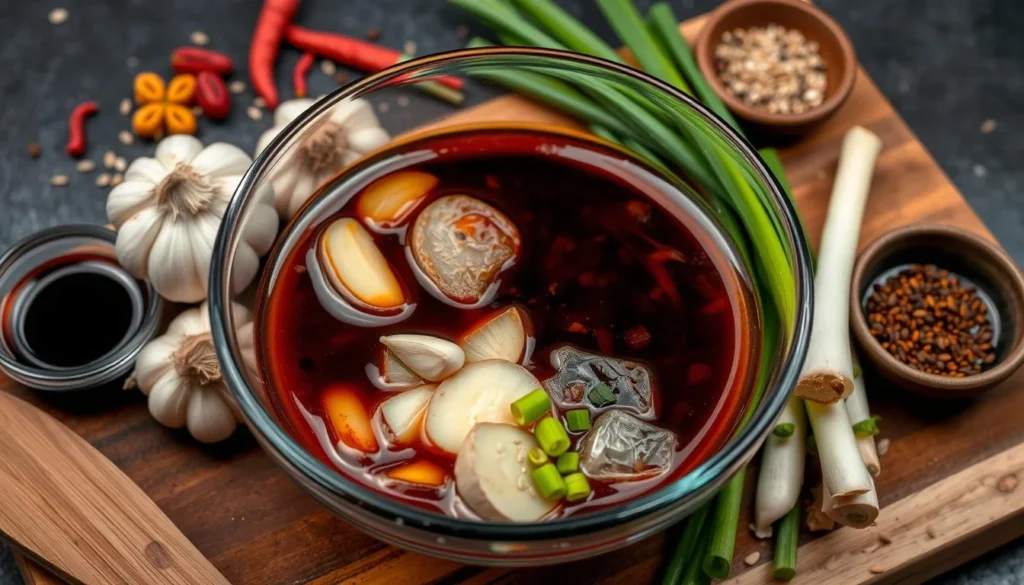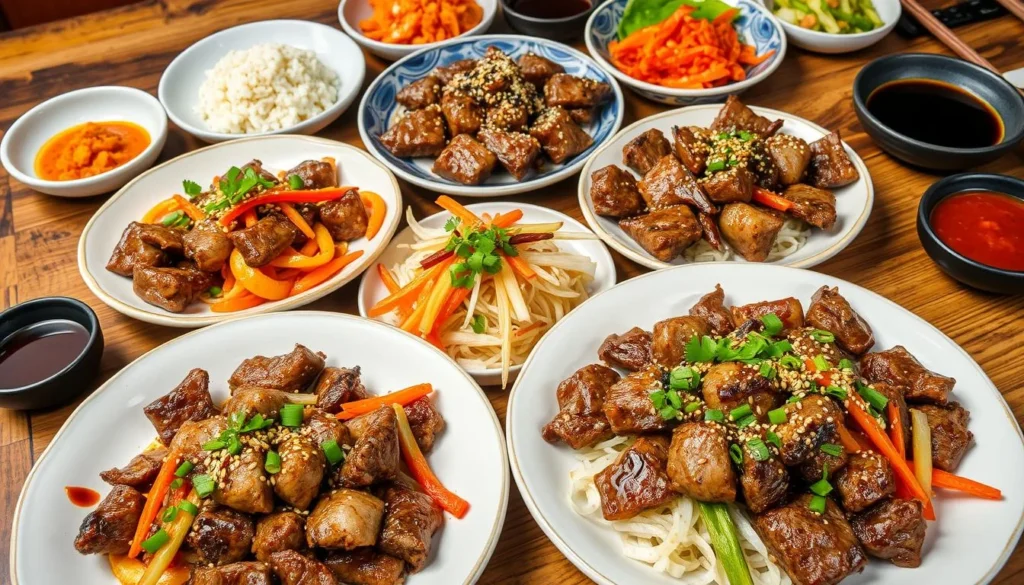Imagine biting into a juicy, sweet, and savory beef bulgogi recipe. This traditional Korean dish has been loved for centuries. You can make it at home with a simple recipe and an easy marinade. Bulgogi, meaning “fire meat,” is famous for its unique taste and tender texture.
This guide will teach you to make authentic beef bulgogi. You’ll learn about the ingredients, marinade, and cooking methods. It’s perfect for both seasoned chefs and beginners. Enjoy your homemade Korean BBQ beef with a simple marinade for a quick, tasty meal.
Table of Contents
What is Beef Bulgogi?
Beef bulgogi is a beloved Korean dish known for its authentic bulgogi flavors and tender beef. It’s a traditional bulgogi recipe where thinly sliced beef is marinated in a sweet and savory sauce. Then, it’s grilled or pan-fried to perfection.
This dish is a must-try in Korean cuisine. It’s often served with steamed rice, in tacos, or as a filling for kimbap.
For those wanting to make homemade beef bulgogi, the marinade and ingredients are key. A great marinade has soy sauce, sugar, garlic, and sesame oil. This mix gives bulgogi its unique taste.
The beef, usually ribeye or sirloin, should be thinly sliced. It needs to marinate for at least 4 hours. This ensures the beef is tender and flavorful.
Origin and History
Bulgogi’s history goes back to the Goguryeo era. It was a luxury food for special occasions. Over time, different regions in Korea have made their own versions of bulgogi.
Key Ingredients
The main ingredients in bulgogi are thinly sliced beef, soy sauce, sugar, garlic, and sesame oil. The marinade is what makes bulgogi special. It gives the dish its flavor and tender texture.
Adding Asian pear and green onions can also improve the taste and texture of bulgogi.
Ingredients You Will Need for Beef Bulgogi
To make a delicious Korean beef recipe, you need the right ingredients. The best bulgogi sauce combines soy sauce, brown sugar, rice wine, and Asian pear. These give your dish a sweet and savory taste. For a simple marinade, mix soy sauce, sugar, sesame oil, and garlic.
Here are the ingredients you will need:
- 1 1/2 pounds of skirt steak or flank steak
- 1/2 cup of bulgogi sauce
- 1/4 cup of soy sauce
- 3 tablespoons of brown sugar
- 1 tablespoon of sesame oil
- 1 teaspoon of garlic, minced
- 1/4 teaspoon of black pepper
Optional ingredients include green onions, carrots, and sesame seeds. They add extra flavor and texture. Choose a thinly sliced cut like flank steak or ribeye for even cooking.
With these ingredients, you can make a tasty bulgogi marinade. Remember to marinate the meat for at least 5 minutes but no more than 2 hours for the best flavor.
| Ingredient | Quantity |
|---|---|
| Soy sauce | 1/4 cup |
| Brown sugar | 3 tablespoons |
| Sesame oil | 1 tablespoon |
| Garlic | 1 teaspoon |
Preparing the Beef for Bulgogi
To make delicious homemade beef bulgogi, you need to prepare the beef right. Choose the right cut and marinate it well. For a traditional recipe, use top sirloin, ribeye, or skirt steak.
When picking the beef, think about the marbling. It makes the meat tender and flavorful. Slice the beef into thin strips, about 1/8 inch thick, for even cooking.
Choosing the Right Cut of Meat
The right cut of meat is key for tender and flavorful bulgogi. Some top choices are:
- Top sirloin
- Ribeye
- Skirt steak
Marinating the Beef
Marinating the beef is a must for tasty bulgogi. A traditional recipe calls for marinating in soy sauce, sugar, garlic, and sesame oil. Do this for at least 1 hour, but up to 12 hours is best. It tenderizes the meat and adds flavor.
By following these steps and using the right ingredients, you can make a delicious homemade beef bulgogi. It’s sure to impress your family and friends. With a step-by-step guide, you can easily make this traditional Korean dish at home.
How to Make the Marinade for Beef Bulgogi
To make a tasty bulgogi marinade, you need a mix of ingredients. The best sauce includes soy sauce, brown sugar, rice wine, and Asian pear. These give the beef a unique flavor and tender texture.
Preparing the marinade is key to bulgogi. Start by mixing 2 tablespoons of soy sauce, 2 tablespoons of brown sugar, 3 tablespoons of water, and 1 tablespoon of toasted sesame oil in a bowl. Add 4 cloves of minced garlic, 1 teaspoon of minced ginger, and 1 chopped green onion. This mix balances savory, sweet, umami, and a hint of heat.
Common Marinade Ingredients
- 1/2 cup of crushed Korean pear
- 1/4 cup of onion purée
- 4 cloves of minced garlic
- 1 teaspoon of minced ginger
- 1 chopped green onion
- 2 tablespoons of soy sauce
- 2 tablespoons of brown sugar
- 1 tablespoon of toasted sesame oil
After mixing all the ingredients, add the marinade to your beef. Refrigerate it for at least 30 minutes or overnight for tougher cuts. This lets the flavors soak into the meat, making it tender and flavorful. With this marinade, you can enjoy a true bulgogi experience with the best sauce.

Steps to Prepare the Marinade
- Combine all the ingredients in a bowl and mix well.
- Add the marinade to your beef and refrigerate for at least 30 minutes or overnight.
- Preheat your grill or pan and cook the beef to your desired level of doneness.
By following these steps and using the right ingredients, you can make a delicious bulgogi dish. It will have an easy marinade and the best sauce, with authentic bulgogi flavors.
Cooking Methods for Beef Bulgogi
To get the perfect flavorful Korean beef recipe, pick the right cooking method. You can grill for a charred taste or pan-fry for ease. Both ways can make Korean BBQ beef taste amazing.
Grilling, pan-frying, and baking are common methods. Grilling adds a nice char and keeps the beef tender. Pan-frying is great without a grill and is just as tasty. Baking works too, but it might not brown as much.
For an easy bulgogi marinade, mix soy sauce, sugar, garlic, and sesame oil. This combo adds a rich flavor to your Korean BBQ beef. Here are some cooking tips:
- Grill the beef for 3-4 minutes per side for medium-rare.
- Pan-fry the beef for 2-3 minutes per side for medium-rare.
- Bake the beef in the oven for approximately 10-12 minutes for medium-rare.
The secret to a great flavorful Korean beef recipe is not to overcook it. Cook it to your liking and serve with your favorite sides. This way, you’ll enjoy a tasty meal.
Serving Suggestions for Beef Bulgogi
When serving homemade beef bulgogi, you want to highlight the traditional recipe. The key is the accompaniments. Traditionally, bulgogi is served with steamed rice and Korean side dishes, or banchan. These include kimchi, ssamjang, and other small plates that enhance the dish’s flavors.
To elevate your bulgogi, consider adding creative serving ideas. You could serve the beef in a bowl with rice and banchan, or use it in tacos or wraps. The goal is to balance tradition and modernity, making the beef bulgogi the main attraction.
Some popular banchan for bulgogi include:
- Kimchi: a spicy fermented cabbage dish
- Ssamjang: a thick, savory sauce made from fermented soybeans
- Japchae: stir-fried glass noodles with vegetables
- Korean cucumber salad: a refreshing salad with thinly sliced cucumbers and tangy dressing
Serving your homemade beef bulgogi with a mix of traditional and creative sides creates a memorable dining experience. It showcases the authentic flavors of this beloved Korean dish.
| Side Dish | Description |
|---|---|
| Kimchi | A spicy fermented cabbage dish |
| Ssamjang | A thick, savory sauce made from fermented soybeans |
| Japchae | Stir-fried glass noodles with vegetables |
| Korean Cucumber Salad | A refreshing salad made with thinly sliced cucumbers and a tangy dressing |
Storing and Reheating Leftover Beef Bulgogi
After enjoying your delicious beef bulgogi recipe, you might have leftovers. It’s important to store and reheat them properly. This keeps the flavor and texture of your easy bulgogi marinade just right. You can keep leftover bulgogi in an airtight container in the fridge for up to 4 days. Or, you can freeze it for 2-3 months.
When you reheat your flavorful Korean beef, make sure it’s hot enough. It should reach 165°F (74°C) for safety. You can reheat it in the oven, on the stovetop, or in the microwave. Here are some tips for reheating:
- Oven: Cover with aluminum foil and heat at 350°F (175°C) for 10-15 minutes.
- Stovetop: Heat on medium heat for 3-5 minutes, adding a small amount of water or broth if needed.
- Microwave: Heat in 30-second intervals, checking the temperature until it reaches 165°F (74°C).
By following these tips, you can enjoy your beef bulgogi recipe again and again. You’ll get to relish the flavors of your easy bulgogi marinade and the tenderness of your flavorful Korean beef.
| Storage Method | Storage Time |
|---|---|
| Refrigerator | Up to 4 days |
| Freezer | Up to 2-3 months |
Variations of Beef Bulgogi Recipes
Exploring different variations of beef bulgogi can enhance your taste experience. By following a step-by-step guide, you can make your own beef bulgogi at home. You can also add your own twist by using unique spices or ingredients.
There are many variations to try, like spicy and vegetarian options. For a spicy version, add red pepper flakes or gochujang to the marinade. For a vegetarian dish, use portobello mushrooms or tofu marinated in soy sauce, garlic, and ginger.
Spicy Bulgogi Variation
This version adds a spicy twist to the classic recipe. Simply add 1-2 teaspoons of gochujang to the marinade. You can adjust the heat to your liking.
Vegetarian Bulgogi Option
This option is great for vegetarians who love bulgogi flavors. Marinate portobello mushrooms or tofu in soy sauce, garlic, and ginger. Then, grill or pan-fry until tender and flavorful.
Here are some tips for making your own beef bulgogi variations:
- Try using different proteins like pork or chicken for unique flavors.
- Experiment with spices like cumin or coriander for added depth.
- Use fruits like pineapple or apple for natural sweetness.

By following these tips and experimenting, you can create your own unique beef bulgogi recipes. A step-by-step guide makes it easy to make delicious bulgogi at home.
| Variation | Ingredients | Instructions |
|---|---|---|
| Spicy Bulgogi | Beef, gochujang, soy sauce, garlic, ginger | Marinate beef in a mixture of gochujang, soy sauce, garlic, and ginger, then grill or pan-fry until cooked through. |
| Vegetarian Bulgogi | Portobello mushrooms or tofu, soy sauce, garlic, ginger | Marinate mushrooms or tofu in a mixture of soy sauce, garlic, and ginger, then grill or pan-fry until tender and flavorful. |
Tips for Perfecting Your Beef Bulgogi
Making perfect beef bulgogi at home is an art. With a few expert tips, you can master this flavorful Korean dish. First, avoid common mistakes like overcooking the beef or using low-quality ingredients. Instead, choose high-quality beef bulgogi marinade and best bulgogi sauce to enhance the meat’s natural flavors.
Common Mistakes to Avoid
One big mistake is overcooking the beef, making it tough and chewy. Keep a close eye on the meat and remove it from heat as soon as it’s cooked. Also, using low-quality soy sauce or brown sugar in the easy bulgogi marinade can ruin the flavor.
Expert Tips for Enhanced Flavor
For a truly flavorful Korean beef recipe, marinate the beef for at least an hour, or up to overnight. This lets the flavors fully develop. Add fresh ingredients like kiwi or onion to tenderize the meat and add depth. When cooking, use high heat like grilling or pan-frying to get that caramelized exterior.

